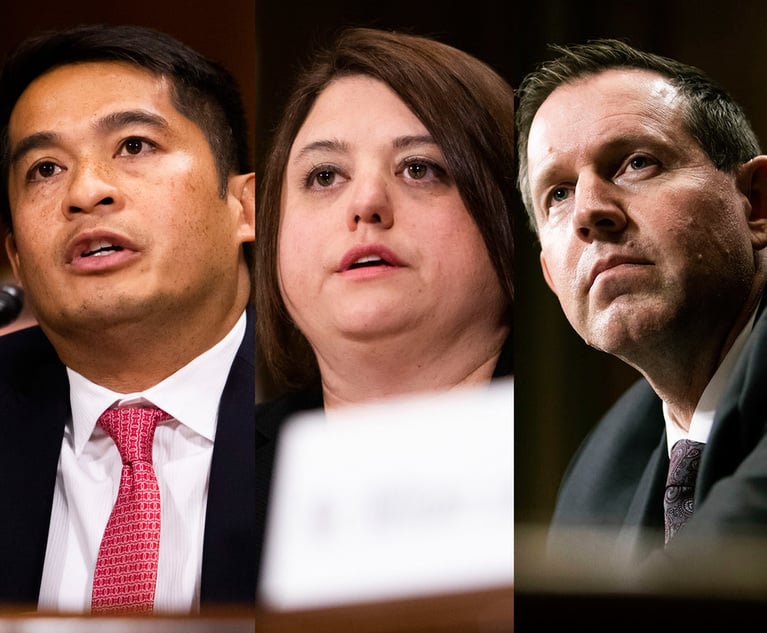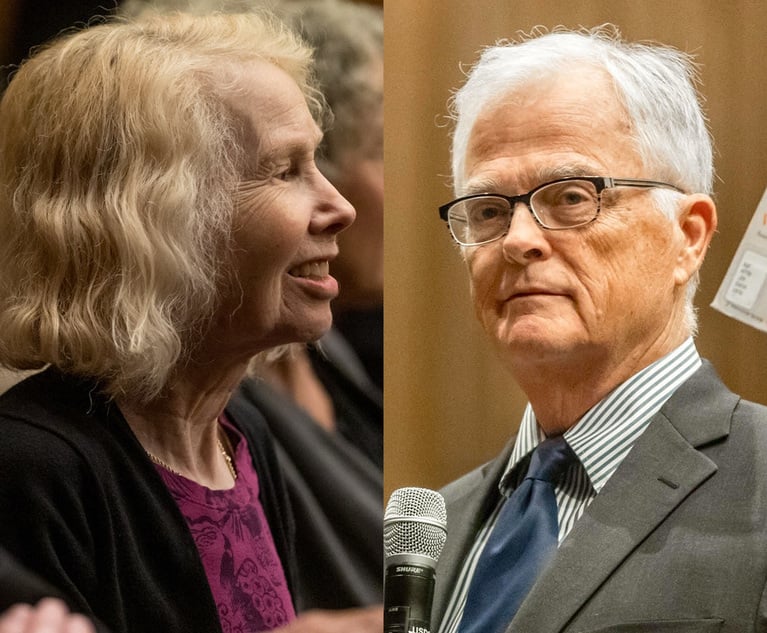 U.S. District Judge David O. Carter hosts his annual celebration of the Marine Corps' birthday outside the federal courthouse in Santa Ana, California, on Nov. 10, 2020. Photo: Meghann M. Cuniff/ALM
U.S. District Judge David O. Carter hosts his annual celebration of the Marine Corps' birthday outside the federal courthouse in Santa Ana, California, on Nov. 10, 2020. Photo: Meghann M. Cuniff/ALM 'So Dave Carter!' Judge's Home Base Reacts to Jan. 6 Subpoenas Ruling on John Eastman, Donald Trump
U.S. District Judge David O. Carter has built a legacy in Orange County's legal community as a fierce patriot with an unorthodox, hands-on approach to his cases.
March 31, 2022 at 04:26 PM
8 minute read
JudgesAmid national news reports of a federal judge's ruling that President Donald Trump's attempts to overturn the 2020 presidential election likely were criminal, the reaction in the judge's home base of Orange County, California, was mostly one of proud expectedness.
"So Dave Carter!" read one text message to a reporter, with emojis of a hand flashing the peace sign and a face wearing shades.
Another: "Judge Carter!!!"
And another: "You see why we all love dad? When push comes to shove he stands tall."
 U.S. District Judge David Carter of the Central District of California. (Photo via Meghann M. Cuniff)
U.S. District Judge David Carter of the Central District of California. (Photo via Meghann M. Cuniff)
The monumental order Monday from U.S. District Judge David O. Carter of the Central District of California drew national attention and praise from the House of Representatives' Jan. 6 Committee, and national media pundits remarked on the rarity of a U.S. trial judge wading into such a politically contentious issue. But in the legal community where Carter has been a fixture since the 1970s, the order epitomized his fearlessness and patriotism that so many have long known.
"This is vintage Judge Carter at its best," said Kate Corrigan, a criminal defense lawyer with Corrigan Welbourn Stokke in Newport Beach. "The whole opinion is him being not just a judge but a true American and lover of democracy. It just oozed that."
Issued on the judge's 78th birthday, the 44-page ruling is the first time a U.S. judge has considered possible crimes committed by a sitting president. It ensures the Jan. 6 Committee will get 101 of the 111 emails Trump's lawyer John Eastman sent between Jan. 4-7, 2021, using his Chapman University account. Carter concluded the crime-fraud exception applied to a draft memo for Trump's lawyer Rudy Giuliani that otherwise would be protected by attorney-client privilege, concluding Trump and Eastman "more likely than not" conspired to obstruct Congress. But it also goes beyond the emails and calls for accountability in the Jan. 6 attacks, with the judge writing: "If the country does not commit to investigating and pursuing accountability for those responsible, the court fears January 6 will repeat itself."
Questions of judicial activism have long followed Carter, who was recused by a colleague from a lawsuit over homelessness in 2018, then had a major injunction vacated by the U.S. Court of Appeals for the Ninth Circuit in a related case, with the panel saying the judge "impermissibly resorted to independent research and extra-record evidence." But he's also long had a reputation for seeking big cases and an innate ability to resolve complex issues.
"He has always been that way, and he has inspired me and some other younger judges—we're not really young anymore, but we were at one time—to try to walk that same faith," said Justice Thomas Goethals of California's 4th District Court of Appeal, Division 3 in Santa Ana.
This content has been archived. It is available through our partners, LexisNexis® and Bloomberg Law.
To view this content, please continue to their sites.
Not a Lexis Subscriber?
Subscribe Now
Not a Bloomberg Law Subscriber?
Subscribe Now
NOT FOR REPRINT
© 2024 ALM Global, LLC, All Rights Reserved. Request academic re-use from www.copyright.com. All other uses, submit a request to [email protected]. For more information visit Asset & Logo Licensing.
You Might Like
View All
Democrats Give Up Circuit Court Picks for Trial Judges in Reported Deal With GOP

Judges Question 9th Circuit’s Unique Binding Dicta Rule. The Criticism Isn't New.

Two Judges. 60-Plus Years on the Bench. Plenty of Advice.

Trending Stories
- 1Gibson Dunn Sued By Crypto Client After Lateral Hire Causes Conflict of Interest
- 2Trump's Solicitor General Expected to 'Flip' Prelogar's Positions at Supreme Court
- 3Pharmacy Lawyers See Promise in NY Regulator's Curbs on PBM Industry
- 4Outgoing USPTO Director Kathi Vidal: ‘We All Want the Country to Be in a Better Place’
- 5Supreme Court Will Review Constitutionality Of FCC's Universal Service Fund
Who Got The Work
Michael G. Bongiorno, Andrew Scott Dulberg and Elizabeth E. Driscoll from Wilmer Cutler Pickering Hale and Dorr have stepped in to represent Symbotic Inc., an A.I.-enabled technology platform that focuses on increasing supply chain efficiency, and other defendants in a pending shareholder derivative lawsuit. The case, filed Oct. 2 in Massachusetts District Court by the Brown Law Firm on behalf of Stephen Austen, accuses certain officers and directors of misleading investors in regard to Symbotic's potential for margin growth by failing to disclose that the company was not equipped to timely deploy its systems or manage expenses through project delays. The case, assigned to U.S. District Judge Nathaniel M. Gorton, is 1:24-cv-12522, Austen v. Cohen et al.
Who Got The Work
Edmund Polubinski and Marie Killmond of Davis Polk & Wardwell have entered appearances for data platform software development company MongoDB and other defendants in a pending shareholder derivative lawsuit. The action, filed Oct. 7 in New York Southern District Court by the Brown Law Firm, accuses the company's directors and/or officers of falsely expressing confidence in the company’s restructuring of its sales incentive plan and downplaying the severity of decreases in its upfront commitments. The case is 1:24-cv-07594, Roy v. Ittycheria et al.
Who Got The Work
Amy O. Bruchs and Kurt F. Ellison of Michael Best & Friedrich have entered appearances for Epic Systems Corp. in a pending employment discrimination lawsuit. The suit was filed Sept. 7 in Wisconsin Western District Court by Levine Eisberner LLC and Siri & Glimstad on behalf of a project manager who claims that he was wrongfully terminated after applying for a religious exemption to the defendant's COVID-19 vaccine mandate. The case, assigned to U.S. Magistrate Judge Anita Marie Boor, is 3:24-cv-00630, Secker, Nathan v. Epic Systems Corporation.
Who Got The Work
David X. Sullivan, Thomas J. Finn and Gregory A. Hall from McCarter & English have entered appearances for Sunrun Installation Services in a pending civil rights lawsuit. The complaint was filed Sept. 4 in Connecticut District Court by attorney Robert M. Berke on behalf of former employee George Edward Steins, who was arrested and charged with employing an unregistered home improvement salesperson. The complaint alleges that had Sunrun informed the Connecticut Department of Consumer Protection that the plaintiff's employment had ended in 2017 and that he no longer held Sunrun's home improvement contractor license, he would not have been hit with charges, which were dismissed in May 2024. The case, assigned to U.S. District Judge Jeffrey A. Meyer, is 3:24-cv-01423, Steins v. Sunrun, Inc. et al.
Who Got The Work
Greenberg Traurig shareholder Joshua L. Raskin has entered an appearance for boohoo.com UK Ltd. in a pending patent infringement lawsuit. The suit, filed Sept. 3 in Texas Eastern District Court by Rozier Hardt McDonough on behalf of Alto Dynamics, asserts five patents related to an online shopping platform. The case, assigned to U.S. District Judge Rodney Gilstrap, is 2:24-cv-00719, Alto Dynamics, LLC v. boohoo.com UK Limited.
Featured Firms
Law Offices of Gary Martin Hays & Associates, P.C.
(470) 294-1674
Law Offices of Mark E. Salomone
(857) 444-6468
Smith & Hassler
(713) 739-1250






